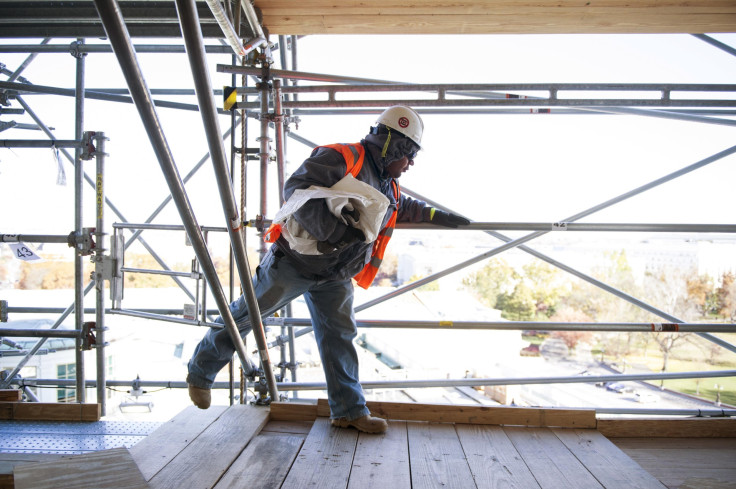Prevailing Wage Laws: Why Are They An Increasingly Popular Target For Republican State Legislators?

Republicans are on a roll when it comes to passing right-to-work legislation, measures that limit unions' rights to collect fees from workers. Not since the laws’ formative years -- the 1940s and '50s, when such measures cropped up across the South and Mountain West -- has there been such a flurry of right-to-work bills. But it’s not the only anti-union measure in vogue.
GOP lawmakers are increasingly moving to repeal statewide prevailing-wage laws, or at the very least scale them back. This session, Nevada has already repealed prevailing wages for school construction projects. A bill that scales back West Virginia’s system awaits the signature of the governor. Indiana nears a repeal. Michigan mulls a similar proposal. Some Wisconsin Republicans see it as the next step after right-to-work.
What are prevailing-wage laws and why all the fuss?
In short, prevailing-wage laws require construction contractors doing business with the government to pay workers at pre-determined levels that are supplied by public authorities.
“The original notion was to protect the local labor market from being invaded by outside people who’d undercut the wages, take the contracts and move on,” said Ross Eisenbrey, vice president of the Economic Policy Institute, a liberal think-tank, and former commissioner of the U.S. Occupational Safety & Health Review Commission.
The idea is, without a wage floor, contractors would want to bid lower and lower, bringing down labor costs, and ultimately hurt the quality of the job. “If you allowed companies to compete [without a floor], that’s a never-ending spiral down,” Eisenbrey said.
The federal Davis-Bacon Act, passed in 1931, mandates prevailing wages on most federally funded public works projects.
But in addition to that, 32 states have adopted what are known as “Little Davis-Bacon” measures -- some more wide-ranging than others -- that apply to state projects. Construction unions like the laws because they keep industry wages relatively high and serve to maintain their bargaining power.
Still, for decades, the measures benefited from bipartisan consensus. The bill's sponsors -- Pennsylvania Sen. James Davis and New York Rep. Robert Bacon -- were both Republicans, as was President Herbert Hoover, who signed the measure into law.
Views have evolved considerably in today’s GOP. A growing number of Republicans say prevailing-wage laws overinflate the cost of doing business and lock in wasteful public spending.
“This sets up an artificial wage and I just think it's better for us to go to the free market," said Republican state Rep. Jerry Torr, sponsor of Indiana’s proposed repeal.
As Republican state Rep. Warren Love wrote to his rural Missouri constituents earlier this month, “If the Cedar County Ambulance Barn was private property, the cost to repair the roof damaged by a September hail storm would be $22,000. However, because it is a public building funded by taxpayers, the prevailing-wage cost of repair is $63,205.88.”
Wisconsin Senate Majority Leader Scott Fitzgerald has said that getting rid of the measures, like passing right-to-work legislation, would be a step toward strengthening the state economy. Supporters of the laws dispute those charges. Overall, they say, prevailing wages attract higher-quality contractors who tend to offset any additional labor costs with higher productivity and safety standards. Higher wages also have a ripple effect that extends well beyond the construction industry.
Much like the push for right-to-work, the anti-prevailing-wage crusade’s growing appeal results most directly from Republicans’ tightened grip on state legislatures. (In 2010, the GOP controlled both chambers in 14 states; This year, Republicans dominate in 30 states.) But it also stems, in part, from a qualitative shift in Republican priorities.
Eisenbrey said it’s not just about undercutting construction unions. He said that like recent attempts to roll back unemployment insurance and workers' compensation, and pass right-to-work measures, it’s part of a broader agenda aimed at eliminating long-standing government protections for workers.
“That’s clearly a goal, to undermine the unions,” he said. “But it’s on the way to a bigger end goal -- to return to a pre-New Deal situation where employers made all the rules.”
West Virginia's Democratic Gov. Earl Tomblin is expected to sign an overhaul of that state's program, which includes a change to the wage-determination formula that is expected to reduce pay. Indiana’s bill has already passed the House, and awaits action in a Senate committee. Indiana's Republican Gov. Mike Pence has said he would sign it. A potential repeal in Michigan finds bubbling support in both chambers. Republican Gov. Rick Snyder has said he’s not interested in the subject. However, Snyder said the same about right to work before signing a bill in 2012.
© Copyright IBTimes 2025. All rights reserved.






















